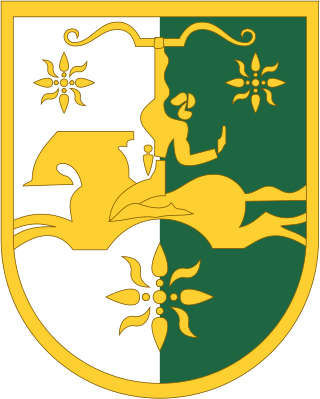
The Transnistria conflict is an ongoing frozen conflict between Moldova and the unrecognized state of Transnistria. Its most active phase was the Transnistria War. There have been several attempts to resolve the conflict, although none have been successful. The conflict may be considered as having started on 2 September 1990, when Transnistria made a formal sovereignty declaration from Moldova.

The Community for Democracy and Rights of Nations, also commonly and colloquially known as the Commonwealth of Unrecognized States, rarely as CIS-2, is an international organization in Eastern Europe and the South Caucasus of three breakaway states in the territory of the former Soviet Union, all of which have limited to no recognition from the international community.

The Republic of Abkhazia is a partially recognized state in the South Caucasus which declared independence from Georgia during the War in Abkhazia (1992–1993). At the time, the Soviet Union had recently collapsed (1991).

The Republic of South Ossetia – the State of Alania is a partially recognized state in the South Caucasus that declared independence from Georgia during the South Ossetia War (1991–1992). At the time, the Soviet Union had only just recently collapsed. Since 1991, South Ossetia has sought recognition as a sovereign state from the international community. South Ossetia is considered by most of the international community to be a part of Georgia.

The Transnistrian republic is recognized by three states with limited recognition, and is a member of one international organization, the Community for Democracy and Human Rights, that was established by these four states.

On 17 February 2008, the majority of members of the Assembly of Kosovo, including Hashim Thaçi, and Fatmir Sejdiu, not acting in the capacity of PISG, declared Kosovo an independent and sovereign state. Kosovo was soon recognized as a sovereign state by the United States, Turkey, Albania, Austria, Germany, Italy, France, the United Kingdom, the Republic of China (Taiwan), and others. This triggered an international debate over whether Kosovo's unilateral declaration of independence had set a precedent in international law that could apply to other separatist movements, or whether it is a special case. The recognition of Kosovo's independence by 101 out of 193 UN states, according to many sources, has given fresh impetus to other separatist movements.

The following outline is provided as an overview of and topical guide to Abkhazia:

Abkhazia and South Ossetia are separatist regions of Georgia in the Caucasus. Most countries recognise them as part of Georgia, while Russia, Venezuela, Nicaragua, Nauru, and Syria regard them as independent. Russia's initial recognition of the independence of Abkhazia and South Ossetia occurred in the aftermath of the Russo-Georgian War in 2008. The government of Georgia considers the republics to be Russian-occupied territories.

Abkhazia–Russia relations is the bilateral relationship between the Republic of Abkhazia and the Russian Federation. Russia recognised Abkhazia on 26 August 2008, following the August 2008 Russo-Georgian War. Abkhazia and Russia established diplomatic relations on 9 September 2008.

Russia's initial recognition of the independence of the Republic of Abkhazia and the Republic of South Ossetia occurred in the aftermath of the conflict in South Ossetia and six months after the western recognition of the unilateral declaration of independence by Serbia's breakaway Republic of Kosovo in February 2008. This, and resultant non-recognition of Abkhazia and South Ossetia by the West, has led to claims of hypocrisy and double standards on the part of both sides of the recognition divide.

Georgia–Moldova relations are the foreign relations between Georgia and Moldova, which were officially established on 25 June 1992. Both countries have separatist zones that are supported by Russia and have suffered wars as a cause of conflicts with them. Additionally, Russian propaganda is present in both countries. Wine from both countries suffered a ban in Russia in 2006 despite their popularity in the country and importance on the trade of Georgia and Moldova with Russia.

Abkhazia–Transnistria relations is the bilateral relationship between the Pridnestrovian Moldovan Republic and the Republic of Abkhazia, two mostly unrecognized states in Eastern Europe. Both states recognize the independence of each other.
Representative Office of South Ossetia, Donetsk is an unofficial diplomatic mission of South Ossetia. The office is located in the capital of the Donetsk People's Republic (DPR), Donetsk. South Ossetia has recognized the DPR, but it hasn't created an official embassy so far as of 2016.

Abkhazia–Tuvalu relations refers to bilateral relations between the Republic of Abkhazia and Tuvalu. Tuvalu recognized Abkhazia's independence on 18 September 2011. Tuvalu has since withdrawn its recognition on 31 May 2014 and has established diplomatic ties with Georgia.

South Ossetia–Transnistria relations Russian: Приднестровско-югоосетинские отношения) is the bilateral relationship between South Ossetia and the Pridnestrovian Moldovan Republic (Transnistria). South Ossetia is recognized by five United Nations member states and Transnistria by none. The bilateral relations are mostly symbolic.













